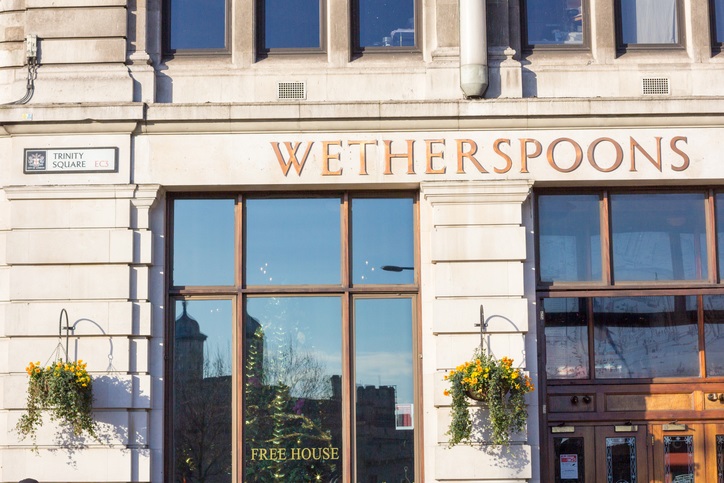ii view: Wetherspoons confident if no more Covid rules
24th March 2022 15:38
by Keith Bowman from interactive investor
Shares for this budget pub operator are down around 40% over the last year. We assess prospects.

First-half results to 23 January
- Revenue up 87% to £807 million compared to H1 2021 (down 13.5% compared to H1 2020)
- Pre-tax loss of £21.3 million (2021 H1: loss of £46.2 million) (2020 H1: Profit of £57.9 million)
- No interim dividend (2021 H1: Nil)
- Net debt up 14% to £920 million
Chairman Tim Martin said:
"Following a traumatic two years for many businesses and people, the ending of Covid restrictions has brought a return to more normal trading patterns in recent weeks. Contrary to some reports, the company has a full complement of staff and is fully stocked, with some minor exceptions.
"Inflationary pressures in the economy have been widely publicised. Overall, the company expects the increase in input prices to be slightly less than the level of inflation.
"Draconian restrictions, which amount to a lockdown-by-stealth, are, of course, kryptonite for hospitality, travel, leisure and many other businesses. The company is confident of a strong future if restrictions are avoided.”
ii round-up:
Founded in 1979, Wetherspoon (J D) (LSE:JDW) today employs over 41,500 people.
Headquartered in Watford, Hertfordshire, it operates over 850 pubs and around 50 hotels connected to its pub outlets.
For a round-up of these latest results, please click here.
ii view:
The FTSE 250 pub company opened its first outlet in Colney Hatch Lane, Muswell Hill, North London. Known for converting unconventional premises into pubs, such as former cinemas and banks, it listed on the London Stock Exchange in 1992. In this latest half year, drink sales generated almost 60% of overall revenues, with food accounting for 36%. Next comes fruit and slot machines at around 3% of revenues, followed by hotels at just over 1%.
For investors, a return to pre-pandemic sales and profitability has not yet been made. Some degree of ongoing Covid related uncertainty is now added to by a cost-of-living crisis and rising interest rates – all factors placing potential pressure on consumer leisure spend. Group debt has risen, and the dividend payment remains suspended.
- Here's why UK shares will pay lower dividends in 2022
- A guide on how investors can protect against inflation
- Terry Smith on Warren Buffett and how to find good companies
More favourably, both supply chain and labour issues are being managed. Covid restrictions have also ended, while spring and summer weather may help consumers return to its outlets. Rising energy prices and UK inflation at a 30-year high could also see some consumers defecting from higher price rivals. In all, and while other headwinds away from the pandemic now also warrant consideration, investors might like Wetherspoons for its strong brand and market position which could offer long-term recovery potential.
Positives:
- Value customer offering
- Majority freehold properties
Negatives:
- Rising costs
- Uncertain economic outlook
The average rating of stock market analysts:
Buy
These articles are provided for information purposes only. Occasionally, an opinion about whether to buy or sell a specific investment may be provided by third parties. The content is not intended to be a personal recommendation to buy or sell any financial instrument or product, or to adopt any investment strategy as it is not provided based on an assessment of your investing knowledge and experience, your financial situation or your investment objectives. The value of your investments, and the income derived from them, may go down as well as up. You may not get back all the money that you invest. The investments referred to in this article may not be suitable for all investors, and if in doubt, an investor should seek advice from a qualified investment adviser.
Full performance can be found on the company or index summary page on the interactive investor website. Simply click on the company's or index name highlighted in the article.